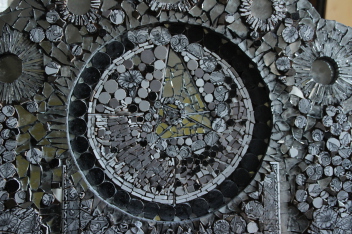I have experience of working with a diverse range of ages and abilities and workshops can be designed and delivered to suit your needs and I offer tuition in
batik and mosaic.
All electrical equipment is PAT tested.
I am covered by 5m of public liability insurance.
I have a current DBS certificate.
- One to one consultations to help you achieve your project, giving you the skills and confidence in design, techniques and materials choices
- Taster sessions - ranging from two hours to residencies. Suitable for all ages and abilities
- Collaborative projects: corporate team building/training days and community pieces
- Talks and demonstrations
Workshops
Batik Workshops
I offer workshops that are designed to inform, inspire and empower.
Smaller sized groups are preferable.
Approaches to batik include conventional light to dark in successive wax resist and dye applications on silk, paper and calico.
This approach gives the learner a good foundation and understanding of the principles of resist-dyeing.
Other approaches, such as discharge dyeing - working in reverse from dark to light using successive applications of wax resists and bleach on fine black discharge cotton encourages a greater versatility, leading to better informed choices and expression.
Learners may wish to apply and develop their drawing skills using kistkas (fine wax stylus pens) and create painterly works with the unique wax resist and dye combination.
The quality of the dye colour is very pure, literally reacting and staining the cloth.
More advanced work might involve layering.
As well as these processes and techniques, a mixed-media approach can be applied such as:
Collage - Using a combination of conventional batik with discharge-dyeing and collage techniques with coloured tissue papers and fabrics.
Tjap Printing - Printing with ornate and beautiful Indonesian copper printing blocks which are used to pattern the cloth with wax
resists prior to dyeing.
Other processes which are safe and effective for working with children of all ages and abilties are excellent for introducing them to some of the traditional African textile designs and processes:
Bogolanfini
- A variation on a traditional discharge dyeing technique used for patterning cloth in Mali using a thickened paste made with
lemon jouce to discharge colour out from pre-dyed cloth.
Adire Eleko - A variation of a traditional process of the Yoruba people of Nigeria using painted and printed paste resist to pattern calico in combination with thickened blue
dye.
Indigo Dyeing - A synthetic version, arguably more reliable and effective.
traditional vat dyeing involving complete immersion of the cloth which when taken from the vat is a brilliant green before it oxidises to shades of blue.
This traditional dyeing process can be combined with other techniques such as batik and sgraffito, which involves scratching the designs into pre-waxed calico before dyeing, similar to the
traditional textile work in Senegal.
Another process involving the use of coloured wax crayons and dyes is a fun, and simple process which is particularly effective for introducing a range of themes.
Mosaic Workshops
I prefer to teach these workshops to
smaller sized groups whether working with adults in a studio or with younger people in a school setting to create individual and collaborative pieces.
Workshops can be designed to any given theme and some of the most popular approaches have included:
Traditional Roman Style - Focusing on the andamento (the flow or movement of the tesserae), traditional uses of motifs and borders.
Gaudi Style - Celebrating the exuberance and creativity of Antoni Gaudi using simple but effective techniques with ceramic, glass, mirror and found objects.
Sculptural mosaics for the home and garden - Using a cut and shaped thermalite base and constructed with cemented ceramic.
Mirror mosaics -
Bold and dramatic mosaics which change as they reflect their surroundings , using fine Japanese glass cutters for precise shaping as well as randomly shaped pieces. The mosaics can be be decorated
further with coloured glass.
Mosaics From found and recycled materials - A very individual approach giving participants the opportunity to personalise their mosaics with the inclusion of their old
keepsakes, or found objects that have been put away and forgotten about to be incorporated into a design of their own choice. Beads, pottery fragments etc.
Pebble Mosaics - For dramatic wall hung garden features and pathways, constructed on site using an indirect method of pebble mosaic method in
frames.


